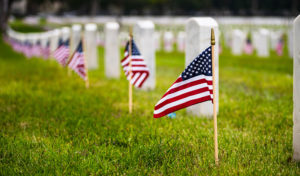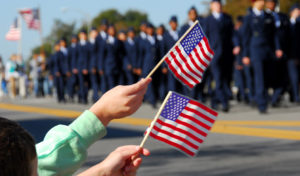Veterans Day vs Memorial Day — while these two holidays take place on separate days, many Americans still confuse them with one another. But, what is the difference between the two? Let’s break them down below.
Veterans Day vs Memorial Day: A Look at These Two Holidays
During the first half of the year, there is one day when people don’t have work or school in celebration of military personnel. Fast forward to the second half of the year, and another day that seemingly celebrates the same thing comes along again. But, are Memorial Day and Veterans Day the same?
While both holidays are related to the military, they are not one and the same. It is important that Americans understand the difference between the two. In doing so, they can gain a deeper appreciation for the holidays and celebrate them accordingly.
What Is Veterans Day?
Veterans Day is a federal holiday that falls on November 11 every year. The date is of particular note because it marks the unofficial end of World War I. Although the Treaty of Versailles wouldn’t be signed until June 28, 1919, it was on November 11, 1918, when fighting ceased thanks to the armistice with Germany. This is where the holiday got its original name — Armistice Day.
Although the United States (and other parts of the world) celebrated Armistice Day, it was not until 1938 that Congress officially designated it a federal holiday. Years later, in 1954, Armistice Day became Veterans Day.
Interestingly, Veterans Day was moved to the fourth Monday of October in 1971, where it stayed until 1977. This was to align it with the Uniform Monday Holiday Act. But, to preserve the significance of the date, President Gerald Ford returned the holiday to November 11 in 1978.
What Is Memorial Day?
 Memorial Day is a federal holiday that falls on the last Monday of May. Originally known as Decoration Day, the holiday started out as a way to commemorate soldiers who fought and died in the American Civil War. The first observance took place on May 30, 1868. As such, Memorial Day is older than Veterans Day.
Memorial Day is a federal holiday that falls on the last Monday of May. Originally known as Decoration Day, the holiday started out as a way to commemorate soldiers who fought and died in the American Civil War. The first observance took place on May 30, 1868. As such, Memorial Day is older than Veterans Day.
Memorial Day didn’t start out as an official holiday, though. The exact origin of Memorial Day remains unknown, but it was Union General John A. Logan of the Grand Army of the Republic who codified it. Waterloo, New York, is widely regarded as the birthplace of Memorial Day, as a celebration was recorded way back in 1866.
In 1971, Congress designated Memorial Day as a federal holiday. It was also during this year that the date of the holiday was moved to the last Monday of May. Prior to that, the United States celebrated Memorial Day every 30th of May.
What Is the Difference Between Memorial Day and Veterans Day?
To understand the difference between Veterans Day and Memorial Day, it is essential to look at their histories.
Veterans Day began as a way to commemorate those who served in World War I. But, more wars broke out following the end of “the war to end all wars.” More Americans took up arms and fought for the nation. By 1954, Congress decided to change the name from Armistice Day to Veterans Day. This also expanded the holiday to honor all veterans, not just those who fought in World War I.
It is worth noting, though, that some countries still retain the name Armistice Day.
If Veterans Day honors all veterans, then what is Memorial Day? In comparison, Memorial Day honors all those who have died while serving in the United States Armed Forces. Veterans Day commemorates all veterans, both living and otherwise.
What About Armed Forces Day?
Armed Forces Day is a national holiday that falls on the third Saturday of May. It was first celebrated on May 20, 1950, after President Harry S. Truman signed a proclamation. In 1961, President John F. Kennedy declared it a national holiday (but not a federal holiday).
Veterans Day honors all veterans, while Memorial Day honors all those who have died while serving the United States Armed Forces. Armed Forces Day, on the other hand, honors all the men and women who are currently serving the five military branches of the United States: the U.S. Army, the U.S. Navy, the U.S. Coast Guard, the U.S. Air Force, and the U.S. Marine Corps.
How to Celebrate Veterans Day vs Memorial Day
There are a number of ways Americans can celebrate Veterans Day, including but not limited to:
 Attending a state or local Veterans Day event
Attending a state or local Veterans Day event- Watching a broadcast or live stream of the national ceremonies at Arlington National Cemetery
- Asking a veteran to share his/her story
- Flying the American flag
- Volunteering at a facility or nonprofit organization
- Donating to a nonprofit organization or charity that supports veterans and their families
- Learning more about U.S. military history
Meanwhile, thanks to its date, Memorial Day is often associated with the beginning of summer. As such, summer activities sometimes overshadow the holiday. Here are the best ways to honor fallen heroes on Memorial Day:
- Participating in a National Moment of Remembrance
- Watching the National Memorial Day Concert
- Attend a state or local Memorial Day event
- Watching a broadcast or live stream of the national ceremonies at Arlington National Cemetery
- Flying the American flag
- Donating to a nonprofit organization or charity that supports families of fallen service members
- Learning more about U.S. war history
Memorial Day vs Veterans Day Explained
Veterans have sacrificed so much to serve their country and protect the freedom of Americans. Therefore, every citizen should know the meaning behind Veterans Day and celebrate it with respect and gratitude. Part of this is knowing the difference between Veterans Day vs Memorial Day.
RELATED ARTICLES:
- HOA Holiday Decoration Rules And Guidelines
- 11 Most Important Labor Day Facts Every American Should Know
- 9 Thanksgiving Activities For Homeowners To Foster Community Camaraderie


 Attending a state or local Veterans Day event
Attending a state or local Veterans Day event